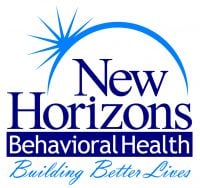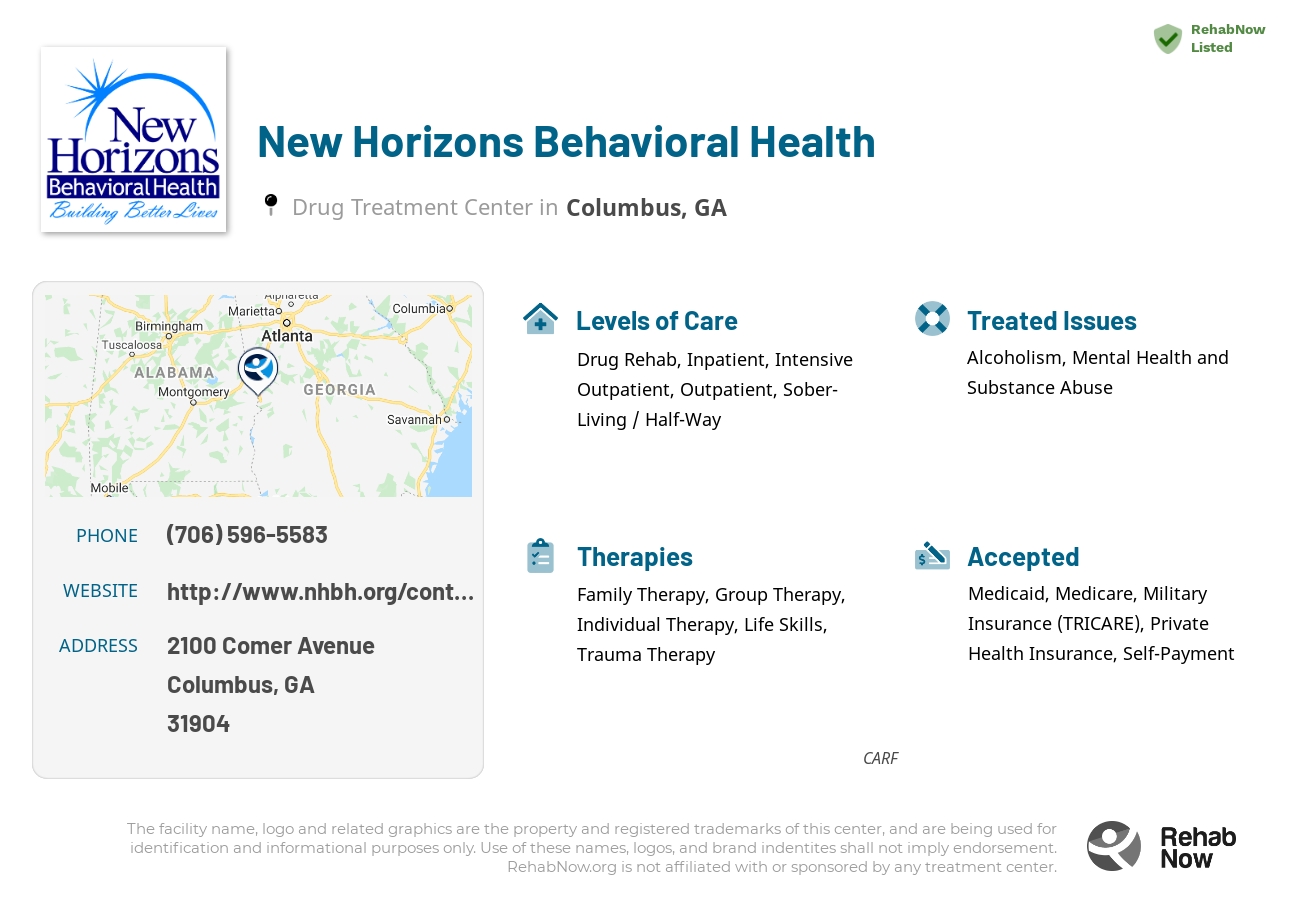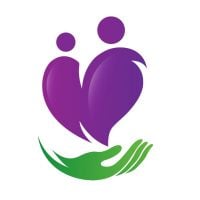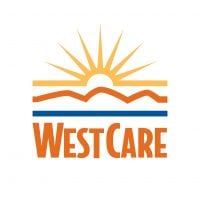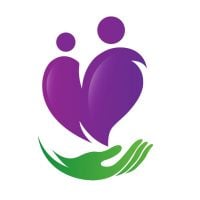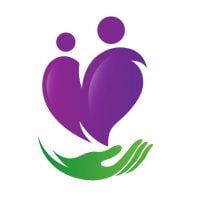New Horizons Behavioral Health
Drug Rehab Center in Columbus, Georgia
New Horizons Behavioral Health provides a comprehensive and individualized treatment plan for individuals suffering from alcohol and drug addiction, as well as dual diagnosis, in Columbus, GA, with a variety of services and levels of care, therapies, activities, and support groups, accredited by CARF and accepting of private health insurance, as part of its holistic approach to addiction treatment.
About New Horizons Behavioral Health in Georgia
New Horizons Behavioral Health, situated in Columbus, Georgia, is dedicated to providing adolescents and adults with comprehensive mental health services and a detailed 12-step focused addiction recovery program. This facility stands out for its wide range of services including medication-assisted treatment (MAT), dual diagnosis care, and a variety of inpatient, outpatient, and aftercare options. Its focus on treating each individual with dignity and respect while equipping them with recovery-focused life skills makes it a unique place for healing.
- 12-Step Focused Program: Tailored to encourage personal growth and accountability in recovery.
- Comprehensive Care Levels: From inpatient to aftercare, ensuring a continuum of support through each recovery phase.
- Medication-Assisted Treatment (MAT): Offers an evidence-based approach for opioid recovery, supporting clients medically and psychologically.
New Horizons Behavioral Health is distinguished by its accreditations, including CARF, ensuring high-quality standards in care. Accepting various insurance options and providing financial aid, they make accessible their multifaceted services ranging from dual diagnosis to assertive community treatment (ACT), enhancing the path to sobriety for many.
Catering to a broad spectrum of needs, New Horizons addresses addictions and issues ranging from substance abuse to developmental disabilities. With a blend of psychotherapy and life skills training, supported by inpatient and outpatient treatments, clients receive tailored care designed for effective recovery and reintegration into their communities.
Genders
Ages
Modality
Additional
Accreditations
SAMHSA

JCAHO

CARF
The Commission on Accreditation of Rehabilitation Facilities (CARF) is a non-profit organization that specifically accredits rehab organizations. Founded in 1966, CARF's, mission is to help service providers like rehab facilities maintain high standards of care.
Conditions and Issues Treated
Levels of Care Offered
This center offers a variety of custom treatment tailored to individual recovery. Currently available are Drug Rehab, Inpatient, Intensive Outpatient, Outpatient, Residential, Sober-Living / Half-Way, with additional therapies available as listed below.
Individuals who are suffering from severe addiction or have a high risk for dangerous health concerns are often recommended to receive inpatient treatment.
Choosing to enter an inpatient treatment program is beneficial for people who are suffering from severe addiction, or who have a high risk for dangerous health concerns.
Inpatient treatment is beneficial for:
- People who have a history of severe withdrawal.
- People who have attempted to overcome addiction on their own without success.
- People who have a history of relapse, or have recently relapsed.
- People at risk for drug overdose or withdrawal-related complications.
- People with medical conditions that are worsened by drug or alcohol use.
Addicts who need help with their addiction can enroll in an intensive outpatient program (IOP). But the patient won’t live there during treatment.
IOP involves patients visiting a medical office building regularly for therapy and other services while continuing to live their lives.
IOP is a step up from drug or alcohol detox, but it’s still a phase of recovery, not the end goal. Patients in need of IOP have many options for rehab and treatment.
Outpatient treatment is considered the lower intensity level of addiction treatment. It’s ideal for early phase addiction or lower intensity addictions. It may include weekly sessions instead of daily. It may include weekly sessions instead of daily. Peer group support, 12-step programs, and individual counseling may still be involved but at a lesser frequency than an intensive outpatient program. It is a good choice for someone who doesn’t need to go through a medically supervised detox and who has a supportive home environment. It requires motivation and dedication to commit to the program without constant monitoring.
Sober living homes (abbreviated SLHs or sometimes sober houses) are temporary housing for recovering addicts. The typical SLH functions as a halfway house, providing a stable living environment for addicts in recovery. While at an SLH, residents typically meet with various therapists on site and attend regular 12-step meetings as well as other recovery group meetings.
Residential treatment programs are those that offer housing and meals in addition to substance abuse treatment. Rehab facilities that offer residential treatment allow patients to focus solely on recovery, in an environment totally separate from their lives. Some rehab centers specialize in short-term residential treatment (a few days to a week or two), while others solely provide treatment on a long-term basis (several weeks to months). Some offer both, and tailor treatment to the patient’s individual requirements.
Therapies & Programs
Individual therapy involves one-on-one sessions between the patient and therapist. It provides patients with a safe environment to openly discuss personal and sensitive issues with the therapist. They find the therapist as someone they can trust. Individual therapy aims to identify the core issues that would have led the patient to substance abuse and address them effectively. The therapist can develop patient-specific customized solutions through individual therapy, which aids speedier recovery.
Family therapy is a group problem-solving that aims to improve communication and relationships between the addict, their family, and sometimes friends. The main goal of family therapy for drug addiction is to create an environment where communication can occur without judgment, hostility, or blame. The therapist is with the family as they learn to communicate differently, especially with the addict when s/he is using. The family can learn to reduce their enabling behavior or rally together and support each other during tough times.
An addict’s family can play a vital part in helping them to avoid relapse because they can spot the warning signs and help them get back on track before it becomes too much of a problem. Family therapy is one of the most effective ways to help addicts stay on the path to long-term sobriety. When a drug addict decides that they want to try and get sober, it takes the support of every person they love to succeed. It can be incredibly difficult for loved ones to watch an addict go through the pain and suffering of withdrawal, but by being there with them and supporting them, they can help to make sure that the addiction never returns.
Groups typically involve meetings with other recovering addicts who can relate to one another’s experiences. They might meet in person or online and typically focus on the process of staying sober rather than overcoming a specific addiction.
In these groups managed by New Horizons Behavioral Health, addicts can build a sense of community and develop strong emotional connections with others who understand what they are going through. These beneficial relationships can help addicts overcome their cravings and prevent relapse at any point during the recovery process.
In general, trauma therapy is a clinical process that helps individuals deal with mental stress often caused by traumatic events. The therapist helps the person identify, understand, and work through the problem. This is done with the help of talking about it in group or one-on-one counseling sessions. Therapists use relaxation, role-playing, art, and music to help the person open up about what is bothering them.
There are many different types of trauma therapists, such as psychiatric nurses and counselors. Not everyone is a good candidate for this type of therapy; it is generally reserved for people who have recently experienced a traumatic event and struggle to get over it. It is often done for children, teenage victims of sexual assault, and war veterans.
Since addiction is a chronic physical and mental illness, addicts need to learn as many life skills as possible. Many drug treatment centers offer life skills activities as part of their addiction recovery programs. Examples include cooking classes, employment training, resume writing seminars, parenting classes, and computer training. Life skills activities help addicts find employment, take care of their families, and give back to the community.
Payment Options Accepted
For specific insurance or payment methods please contact us.
Is your insurance accepted?
Ask an expert, call (888) 674-0062
Additional Details
Specifics, location, and helpful extra information.
Columbus, Georgia 31904 Phone Number(706) 596-5583 Meta DetailsUpdated April 15, 2024
Staff Verified
New Horizons Behavioral Health Patient Reviews
There are no reviews yet. Be the first one to write one.
Columbus, Georgia Addiction Information
Prescription opioid use has caused a large increase in the total amount of overdoses in Georgia. Almost 12% of the Georgia population uses illicit drugs each year, and slightly over 3.5% also abuses alcohol at the same time. This does not include those who binge-drink at least once a month, which includes 20% of all Georgians.
Columbus, Georgia is one of the top cities for drug use and addiction. An average of 1 person died every day from a drug overdose in 2014. Marijuana, cocaine, crack cocaine, heroin, methadone, and oxycodone are the most abused drugs in Columbus. In 2011, an estimated 10.7% of adolescents aged 12-17 reported using an illicit drug. The type of rehab center you choose will depend on the severity of your addiction.
Treatment in Nearby Cities
- Douglas, GA (141.9 mi.)
- College Park, GA (86.5 mi.)
- Morven, GA (137.7 mi.)
- Washington, GA (156.0 mi.)
- Columbus, GA (1.6 mi.)
Centers near New Horizons Behavioral Health
The facility name, logo and brand are the property and registered trademarks of New Horizons Behavioral Health, and are being used for identification and informational purposes only. Use of these names, logos and brands shall not imply endorsement. RehabNow.org is not affiliated with or sponsored by New Horizons Behavioral Health.
